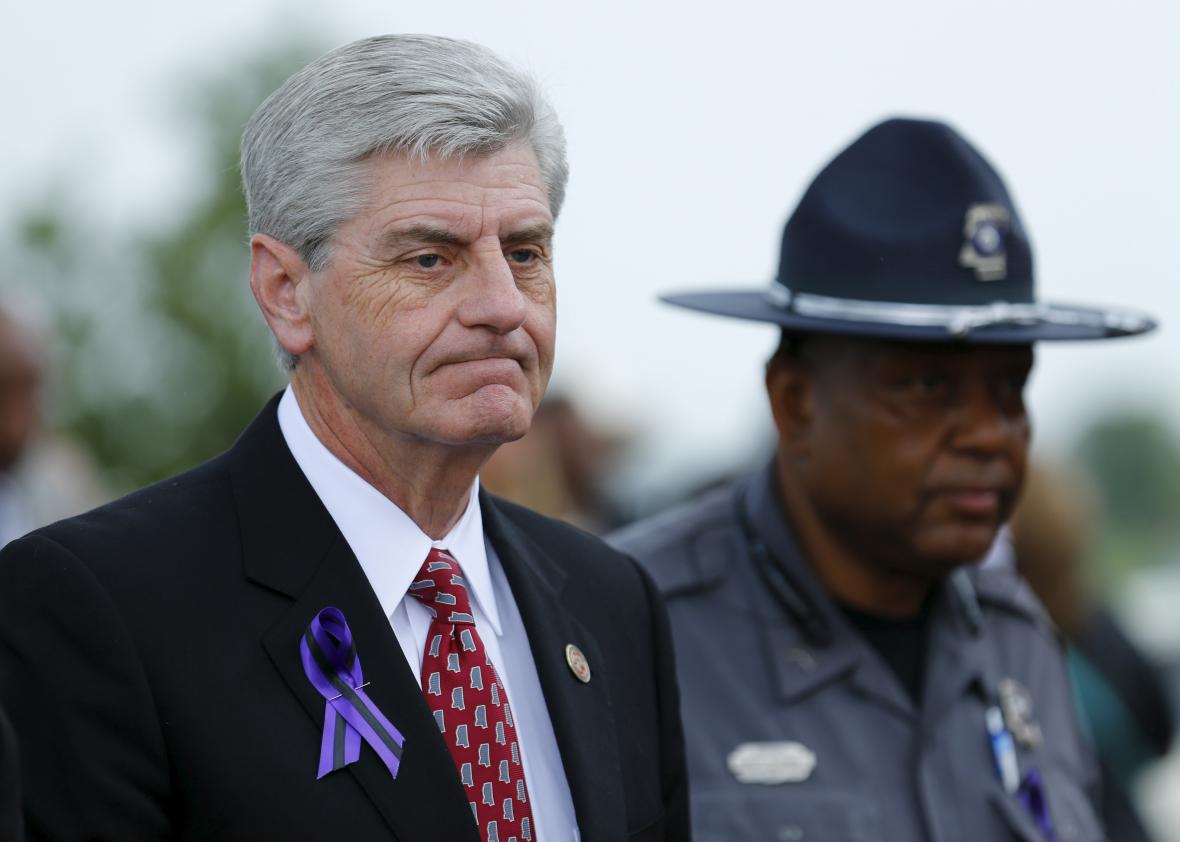Mississippi Gov. Phil Bryant is not a fan of the First Amendment. We know this because last April, Bryant signed HB 1523, a disturbing law singling out three specific anti-LGBTQ religious beliefs and granting their holders a license to discriminate against LGBTQ people in housing, employment, medical treatment, public accommodations, adoptions, and marriage licensing. When a state provides special rights to certain people by endorsing certain beliefs in a way that burdens nonbelievers—as HB 1523 clearly does—it runs afoul of the First Amendment’s Establishment Clause. That’s what U.S. District Judge Carlton Reeves ruled in June when he blocked the law, and it’s what challengers to the statute are arguing in the next round of litigation at the U.S. Court of Appeals for the 5th Circuit.
Now the attorneys whom Bryant has tasked with defending HB 1523 have struck back in a wildly unhinged brief that reads more like a deranged rant than a legal argument. Here’s a sample of this curious brief’s highlights:
- Bryant’s attorneys argue that homosexuality is not immutable. That is odd, since the Supreme Court explicitly said it was in Obergefell v. Hodges. The brief’s response? Obergefell was wrong, and many gay people actually choose to be gay. In support of this proposition, the brief cites a single Harvard professor who once wrote a book on the theoretical fluidity of female sexuality.
- The brief alleges that the three beliefs protected by HB 1523—that same-sex marriage and premarital sex are wrong and that transgender identity is a lie—are “not ‘religious’ beliefs.” This assertion would surprise the bill’s authors, who described their measure as “AN ACT … TO PROVIDE CERTAIN PROTECTIONS REGARDING A SINCERELY HELD RELIGIOUS BELIEF” and referenced “religious belief” 22 times in its text.
- Bryant’s lawyers declare that “homosexuals have enormous political clout,” while “devout Christian mom-and-pop-shop owners … are being bullied by ideologues.” Thus, gay people deserve no legal protection while business owners deserve a right to discriminate.
- The brief refuses to acknowledge the legitimacy of transgender identities, instead repeatedly referring to “transgender behavior.” This subtle dig at trans people is a specialty of the Alliance Defending Freedom, an anti-LGBTQ legal group. Kevin H. Theriot, an ADF attorney, co-authored the brief.
- Despite the fact that many legislators who supported HB 1523 cited their anti-gay Christian beliefs as justification for the law, Bryant’s lawyers urge the court to ignore these statements. After all, “it is common and perfectly constitutional for individual lawmakers to invoke Christian doctrine as a reason for supporting a law.” (The brief points to President Barack Obama’s reference to “the Golden Rule” when “publicly defending his Administration’s transgender-restroom edicts.”)
- Bryant’s attorneys write that “there is nothing a federal court can do to remove an endorsement of religion that appears in a duly enacted law.” That would be news to the multiple Supreme Court justices who have voted to strike down a law for endorsing religion.
- The brief scoffs at the challengers’ fear that HB 1523 provides businesses a license to discriminate against same-sex couples, calling this interpretation of the law “hysterical.” Huh? This is precisely what the law was intended to do—a fact that the attorneys acknowledge elsewhere in the brief! Yet Bryant’s attorneys demand that the court selectively ignore the plain text of the law, huffing that “federal courts must defer to limiting constructions of statutes adopted by state officials and the lawyers who represent them in court.” Tellingly, they do not even attempt to support this diktat with legal authority.
What’s going on here? Perhaps Bryant’s attorneys forgot that they were writing a legal brief rather than a dashed-off diatribe in an online comments section. Or maybe they recognized that they are fighting a losing battle and decided to seize this opportunity to promulgate their fringe bigotries without apology. Either way, the result is an entertaining screed that stands little chance of succeeding in court. And unless the 5th Circuit decides to embrace the ADF’s propaganda rather than the rule of law, Mississippi’s attempt to establish an anti-LGBTQ religion appears headed for defeat.
